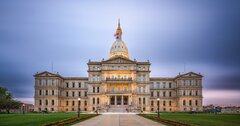
Lawmakers in Lansing have been debating a series of bills aimed at increasing the amount of money available to repair Michigan roads. The House plan, which passed in late October, would provide $1.2 billion to repair roads by raising fuel and vehicle registration taxes to the tune of $600 million over time, and dedicating $600 million over time from increasing income tax collections.
The Senate version of the plan, passed November 3, also allocates $1.2 billion for roads with a $600 million tax increase, though it relies more heavily on a gas tax increase (as compared to a registration fee hike) than does the House plan.
Under the House plan, tax hikes would be accompanied by possible personal income tax cut, if revenue growth in the general fund surpasses inflation in a given year. Additionally, the plan would expand the homestead property tax credit by raising the household income cap from $50,000 to $60,000, while raising the maximum value of the credit to $1,500.
The Mackinac Center has been vocal about the fact that just because lawmakers promise tax cuts in the future does not mean those cuts will actually materialize. James Hohman, the assistant director of fiscal policy for the center, was quoted by MLive in an article about the tax-relief components of the bills.
"The most important thing is to reduce the rate, because what matters to (economic) growth is the marginal rate of taxation, whether people are going to invest or spend or do something else to employ others," Hohman said.
The Mackinac Center, however, is skeptical of the income tax rollback component of the House road funding plan because it would not bind future legislators, who could simply undo the trigger before it was ever pulled.
Michigan's income tax rose from 3.9 percent to 4.35 percent in 2007 as part of a last-minute budget deal under then-Gov. Jennifer Granholm. The rate was scheduled to rollback to 3.9 percent by 2015 but was frozen at 4.25 percent in 2011 under current Gov. Rick Snyder.
"Michigan's history indicates that a lot of times these phaseouts just don't happen," said Hohman. "The Small Business Tax, the personal income tax phaseout under Granholm. Future Legislatures rarely feel like these are strong promises to taxpayers."
The full article is available at MLive.
Get insightful commentary and the most reliable research on Michigan issues sent straight to your inbox.

The Mackinac Center for Public Policy is a nonprofit research and educational institute that advances the principles of free markets and limited government. Through our research and education programs, we challenge government overreach and advocate for a free-market approach to public policy that frees people to realize their potential and dreams.
Please consider contributing to our work to advance a freer and more prosperous state.